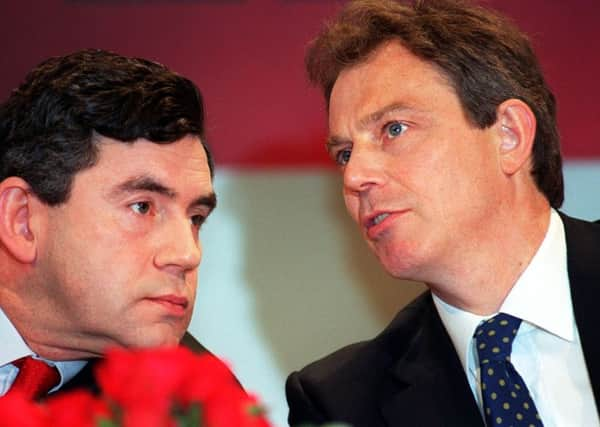Tom Richmond: Over to Labour to set out a positive plan for Britain


Fast forward a quarter of a century and Labour is now heading back in time as Jeremy Corbyn and John McDonnell look to renationalise key industries and, following the collapse of Carillion, banish such firms from the state sector.
They say their case for the undiluted socialism that Brown, the then Shadow Chancellor, distanced Labour from before Tony Blair became leader continues to be vindicated by Carillion and by Transport Secretary Chris Grayling’s mishandling of the railways.
Advertisement
Hide AdAdvertisement
Hide AdYet, while Labour remains tantalisingly close to returning to power for the first time since John Major’s government fell apart because of splits over Europe, the current leadership can’t just wait and hope to be elected if Theresa May is toppled.
Like New Labour, they need to make a far more positive – and convincing – case for office and that means setting out, in detail, the services that it expects to deliver and the benefits to the public purse of the Government, and local councils, effectively taking on responsibility for the NHS, schools, prisons, transport, energy and so on.
Given how Britain is still coming to terms with the decision to leave the European Union without any clear idea of what such a vote would ultimately mean for the economy, not to mention society in general, the last thing that the country needs is another uncosted plan – even if it was Brown’s betrayal of the principles that he set out on this day in February 1993 that meant Britain could not withstand the global financial crash and which, in turn, contributed to the Brexit backlash.
WHEN a supervisory board was set up last August to oversee the East Coast Main Line, it was intended to ensure “one voice representing customers, holding the rail industry to account and ensuring the different elements work together to drive improvements”.
Advertisement
Hide AdAdvertisement
Hide AdIf only. The line’s franchise is being terminated amid political scandal and Network Rail admitted this week that the body, chaired by Welcome To Yorkshire chief executive Sir Gary Verity, has only met twice since its inception and minutes of these meetings have not been published. They should be.
Asked to name the board’s successes thus far, a Network Rail spokesman says unconvincingly: “No specific achievements but the board is putting focus on short term improvements for customers using the network as well as creating a long term strategy.”
I suspect the short-term goal is simply ensuring that everyone makes it to Sir Gary’s Great Exhibition of the North and his myriad bike races. I hope I’m wrong.
FAILING Chris Grayling says the Tories need to do more to counter Labour’s ‘fake news’. He then cites, by example, Health Secretary Jeremy Hunt’s use of Twitter to defend the NHS.
Advertisement
Hide AdAdvertisement
Hide AdHow ironic that Grayling is giving such advice when he’s one of the few Ministers not to hold a Twitter account.
Presumably it’s as broken as the train that split in half outside Leeds Station the other day – or he doesn’t want to be told the truth after his Macavity-like disappearing acts and repeated snubs of this region?
MOST schools have a week off for half-term – subject to teacher training days. Not Parliament. MPs and peers adjourned on Thursday last week and don’t return until Tuesday.
I’m just surprised Parliament could justify an extended break when the country is in crisis. For, even if Ministers did not want to debate Brexit, the need for a joined-up NHS and social care policy is just one of many challenges that does require urgent political attention.
Advertisement
Hide AdAdvertisement
Hide AdTHOUGH they won’t admit it, I truly believe that most of our MPs have more in common than they care to let on.
Take jobs and apprenticeships. As the future of the Yorkshire Dales is debated, Dewsbury MP Paula Sheriff used Parliamentary questions to ask for “a debate on how we can nurture talent in Britain’s small and very proud towns” to stop the most talented young people having to move to bigger cities.
The Labour MP received a sympathetic response from Commons leader Andrea Leadsom. The senior Tory replied: “We should all combine forces to improve these life opportunities for young people.”
I suggested earlier this week that “skills, skills, skills” should be the answer to every Brexit question. Get on with it.
Advertisement
Hide AdAdvertisement
Hide AdNOW that the Queen has ordered the Royal palaces to banish plastic water bottles and straws, the pressure is on sports stadia to do likewise.
After all, one of the more unedifying scenes at cricket Test matches at Headingley is the ‘beer snake’ of empty glasses being passed through the stands by increasingly inebriated spectators.
The response of Headingley and others will be revealing – are they committed to reducing plastic use or will beer sales continue to come first at all costs?
FILLING in for the thankfully, absent Laura Kuenssberg, political reporter Ben Wright managed to use the phrase ‘I think’ three times on the BBC News At Ten while previewing Boris Johnson’s Brexit speech. The clue should be in the once illustrious programme’s name. News – not views.
Advertisement
Hide AdAdvertisement
Hide AdIT looks like the BBC’s ice hockey commentators at the Winter Olympics will be on a diversity training course if they continue with their slip-ups. They keep referring to a team on the powerplay advantage having “a man advantage” – when describing a women’s game.